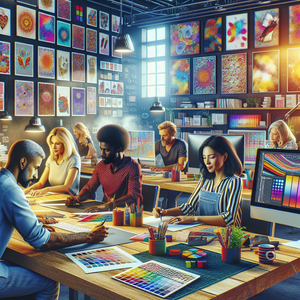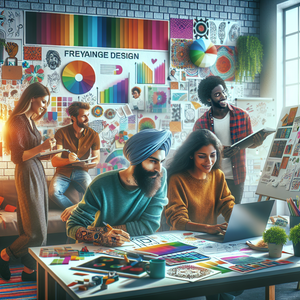The Art of Self-Promotion as a Freelance Game Developer

Before embarking on a promotional journey, freelance game developers must first identify their Unique Value Proposition (UVP). This represents what distinguishes them from their peers and can include a distinctive art style, innovative gameplay mechanics, or expertise in a particular genre. Recognizing your UVP not only streamlines your promotional efforts but also allows you to communicate your worth to potential clients with clarity and confidence.
Building an Impressive Portfolio
A compelling portfolio is one of the most effective tools for self-promotion. It serves as a visual resume, showcasing a freelance developer's skills and capabilities. Here are key elements to consider when crafting an engaging portfolio: 1. Diversity of Projects: Include a variety of projects that demonstrate different skill sets, such as game design, programming, and storytelling. This approach not only shows versatility but can also attract a wider audience. 2. High-Quality Visuals: Present your work with high-quality images and videos. Captivating trailers or gameplay footage can leave a memorable impression on potential clients. 3. Project Narratives: Share the story behind each project. Detail your role, the challenges encountered, and the creative solutions you implemented. This narrative provides depth and showcases your problem-solving abilities. 4. Regular Updates: Keep your portfolio current by regularly adding new projects. An up-to-date portfolio signals that you are active in your field and continuously refining your craft.
Leveraging Social Media Platforms
In the digital age, social media is a powerful ally for self-promotion. Here are strategies for capitalizing on social platforms: 1. Select Appropriate Platforms: Not all social media platforms will resonate with your target audience. Twitter, Instagram, and LinkedIn are particularly beneficial for game developers, each serving unique purposes: Instagram for visuals, Twitter for community engagement, and LinkedIn for professional networking. 2. Engage Actively: Move beyond mere self-promotion; engage with other developers and gamers. Participate in conversations, share insights, and offer feedback. Building relationships can lead to collaborations and referrals. 3. Behind-the-Scenes Content: Audiences appreciate transparency. Share glimpses of your creative process, development hurdles, and personal reflections. This authenticity fosters a connection with your audience and enhances your personal brand. 4. Strategic Hashtag Use: Use relevant hashtags to improve your visibility. A balanced mix of popular and niche hashtags helps you reach a broader audience without overwhelming your posts.
Networking and Collaboration
Networking is vital for self-promotion and can lead to meaningful professional relationships. Here are strategies to build a robust network: 1. Attend Industry Events: Participate in gaming conventions, workshops, and local meetups to connect with fellow developers, publishers, and potential clients. These interactions can spark collaborations and new opportunities. 2. Join Online Communities: Platforms like Discord, Reddit, and specialized forums host active game development communities. Engaging in these spaces allows you to seek advice, share knowledge, and build connections. 3. Collaborative Projects: Collaborating with other developers can expand your skill set and introduce you to new audiences. Joint projects highlight your adaptability and willingness to learn. 4. Seek Mentorship: Finding a mentor in the industry can provide invaluable guidance. Mentors can help you navigate challenges and introduce you to key industry contacts.
In the competitive realm of freelance game development, mastering the art of self-promotion is crucial for success. By understanding your unique value proposition, building a standout portfolio, harnessing the power of social media, and actively networking, freelance game developers can significantly enhance their visibility and attract the right opportunities. As the gaming industry continues to evolve, those who effectively promote their work will be well-positioned to thrive in this vibrant and ever-changing landscape. Ultimately, it’s not just about creating exceptional games; it’s about ensuring the world knows about them. Embrace self-promotion as an essential skill, and watch your freelance career flourish.
Indie Game Designer
Small studios, indie game teams, or self-publishing platforms like itch.io
Responsibilities
Conceptualize and develop original game ideas, mechanics, and storylines tailored for indie audiences.
Collaborate with artists and programmers to create engaging gameplay experiences using game development engines (e.g., Unity, Unreal Engine).
Playtest and refine game elements based on user feedback and gameplay metrics.
Required Skills
Proficiency in game design principles and mechanics.
Strong knowledge of game development software and tools.
Excellent storytelling skills to craft immersive narratives.
3D Game Artist
Indie studios, AAA game developers, and virtual reality companies
Responsibilities
Create high-quality 3D models, textures, and animations for characters, environments, and props.
Collaborate with game designers to ensure artistic vision aligns with gameplay requirements.
Optimize 3D assets for performance across various platforms (PC, console, mobile).
Required Skills
Proficiency in 3D modeling software (e.g., Blender, Maya, ZBrush).
Strong understanding of texturing, lighting, and rigging principles.
Ability to work within a game engine (like Unity or Unreal Engine) to implement assets.
Game Programmer (C# Specialist)
Indie studios, mobile game developers, and interactive media companies
Responsibilities
Develop gameplay features and mechanics using C# within Unity.
Collaborate with designers and artists to implement game systems and troubleshoot any issues.
Optimize code performance and conduct debugging sessions to ensure a smooth gaming experience.
Required Skills
Strong proficiency in C# and experience with Unity game engine.
Knowledge of game development frameworks and design patterns.
Familiarity with version control systems (e.g., Git).
Narrative Designer
Game development studios focused on story-driven games, narrative-focused indie developers, and interactive entertainment companies
Responsibilities
Craft engaging narratives and dialogue for games, ensuring character development and plot coherence.
Collaborate with game designers, artists, and sound designers to create a cohesive storytelling experience.
Develop lore, backstories, and quest lines that enhance player immersion.
Required Skills
Strong writing and storytelling abilities, with experience in branching narratives.
Familiarity with interactive storytelling tools and software.
Ability to analyze player behavior and feedback to refine narrative elements.
Game Marketing Specialist
Indie game studios, marketing agencies specializing in gaming, and crowdfunding platforms
Responsibilities
Develop and execute marketing strategies to promote indie games across various platforms.
Create engaging content for social media, blogs, and press releases to build community interest and awareness.
Analyze marketing campaign performance and adjust strategies based on data insights.
Required Skills
Strong understanding of digital marketing principles and platforms (SEO, social media, email marketing).
Excellent communication skills, both written and verbal, for effective brand messaging.
Experience with analytics tools to track and report on campaign performance.


